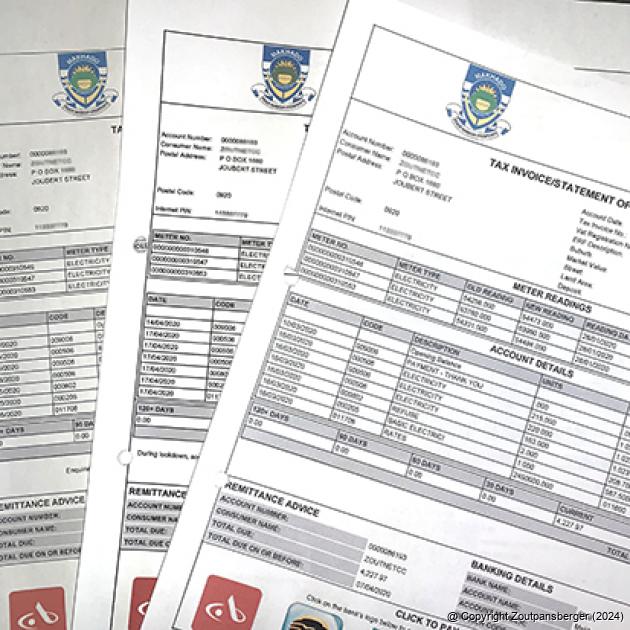

ADVERTISEMENT:

Generic image.
We are not using wrong tariffs, says municipality
Date: 08 October 2020 By: Andries van Zyl
Is the Makhado Municipality deliberately ripping off consumers by forcing them to pay inflated monthly electricity bills? This was the question asked by the newspaper last week. According to the municipality, they are not.
The newspaper reported last week on how the municipality seemingly frequently neglects to take monthly electricity readings at homes and businesses, sometimes for up to 90 days. They then take a reading again for the entire period and charge the consumer for the combined reading. This results in electricity consumption’s being grossly inflated, with consumers being charged on a higher kWh (kilowatt-hour) rate.
“The municipality is aware of concerns regarding meter readings. We, however, dispute that the municipality neglects taking readings because meter readings are taken on a monthly basis,” said municipal spokesperson Mr Louis Bobodi on Tuesday in response to the article. “Furthermore, we dispute the use of incorrect tariffs. The tariffs that the municipality are using are in line with those recommended by NERSA,” added Bobodi.
Bobodi was referring to the different tariffs for the different “blocks” of consumption. At this stage we must point out that the newspaper never stated that the municipality uses incorrect tariffs. The article suggests that the municipality is calculating monthly consumption incorrectly.
At present, consumers are paying R1,0596 (Block 1) per kWh for the first 50 kWh of monthly use. Between 51 and 350 kWh, consumers are paying R1,37 (Block 2) per kWh, and for consumption between 351 and 600 kWh the cost is R1,9372 (Block 3) per kWh. For every kWh over 601 kWh per month, consumer will have to fork out R2,311 (Block 4) per kWh.
This is where residents’ concerns come in.
Many argue that if the municipality skips a meter reading for a month or two, the consumer with an average residential electricity consumption of (for example) 900 kWh per month, could end up with a combined electricity bill of 2 700 kWh. If no adjustments are made to allow for average use in the different tariff “blocks”, the consumer could end up paying R52,98 for the first 50 kWh (Block 1), R411 for the next 300 kWh (Block 2), R484,30 for the next 250 units in Block 3 and a massive R4 853,10 for the remaining 2 100 units, bringing the total bill to R5 801,38. If monthly readings were taken, the consumer (with an average of 900 kWh) would pay exactly the same for the first three tariff blocks, but only R693,30 in Block 4 for a total monthly account of R1 641,58. If you multiply this average monthly account by three months, the total is R4 924,74. This is R876,64 less than the account where no readings were taken for three months.
At least two residents took the time to meticulously calculate their “losses” due to “wrong” calculations. Louis Trichardt resident Duncan Campbell calculated that he paid R555 too much the last couple of months for a family of two. Another Louis Trichardt resident, Johann Hammann, declared a dispute with the municipality after calculating that he had been overcharged by R1 500 over two months.
According to Bobodi, adjustments were made on accounts that were affected by incorrect billing. “The municipality has already embarked on a program of replacing conventional meters with prepaid ones, at no costs to the consumers, which will eventually result in the reduction of the number of queries or complaints about meter readings,” said Bobodi.
In cases where a meter cannot be read, Bobodi said, an estimation based on the average consumption of the previous three months would be used to determine the billing for the month. “However, efforts are made to ensure that actual readings are taken in order to correct the estimated average readings,” said Bobodi. He added that only consumers who were overbilled and had made payments based on the overbilling would be refunded if they had a credit on their account.
Viewed: 1029
|
|
Tweet |

-

MMSEZ now also looking at nuclear power
19 April 2024 By Andries van Zyl -

Woede ná R524 nog ‘n lewe eis
19 April 2024 By Andries van Zyl -

T20-spanne hervat liga ná kort breek
19 April 2024 By Andries van Zyl -

Vrae oor waarom Vhembe so sloer?
18 April 2024 By Andries van Zyl -

Border fence contractors lose appeal
18 April 2024

Andries van Zyl
Andries joined the Zoutpansberger and Limpopo Mirror in April 1993 as a darkroom assistant. Within a couple of months he moved over to the production side of the newspaper and eventually doubled as a reporter. In 1995 he left the newspaper group and travelled overseas for a couple of months. In 1996, Andries rejoined the Zoutpansberger as a reporter. In August 2002, he was appointed as News Editor of the Zoutpansberger, a position he holds until today.

More photos...

ADVERTISEMENT


-

Park development leaves residents puzzled
22 March 2024 By Andries van Zyl -

Local para-athletes shine at SA Champs
05 April 2024 -

Former Triegie’s acting career taking off
12 April 2024 By Karla van Zyl -

Epic finish for local cycling duo
29 March 2024 By Andries van Zyl -

What next Vhembe!
22 March 2024 By Andries van Zyl

ADVERTISEMENT:


ADVERTISEMENT


